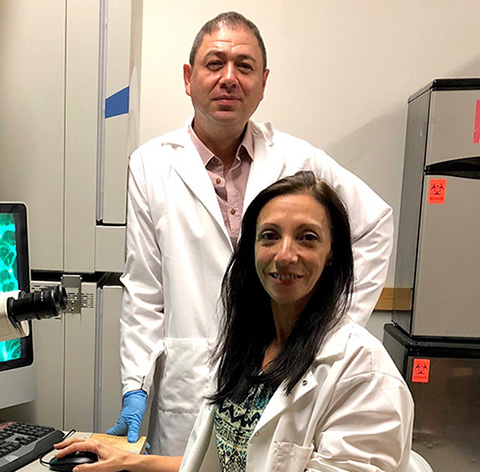
A team of researchers from Duke University School Medical Center is taking a new approach to developing a treatment for Parkinson’s Disease (PD), and it could have implications for developing therapies for other diseases.
For the first time, reserachers have successfully modified the expression regulation of the gene that encodes α-synuclein, SNCA, using an epigenetically based system. Their work provides a proof-of-concept that manipulation of gene expression programs, and more specifically reversing overexpression, by epigenome editing may lead to valuable therapeutics for neurological disorders such as PD.
The lab of Ornit Chiba-Falek, Ph.D., associate professor in the department of neurology at the Bryan Alzheimer’s
Disease Research Center and the Center for Genomic and Computational Biology at Duke University Medical Center studies how dysregulation of gene expression contributes to age related neurodegenerative diseases. Boris Kantor, Ph.D., assistant research professor and director of the Viral Vector Core at Duke develops novel viral vector tools to be used in translational science. The two groups combined their efforts, one on the side of technology and the other focused on the premise, to accomplish this work. They published their results in the August 28th edition of Molecular Therapy in a paper entitled “Downregulation of SNCA expression by targeted editing of DNA-methylation: A potential strategy for precision therapy in PD.”
Kantor told Clinical OMICs it is incredibly exciting that “an epigenome editing–based system can be applied as a new approach to modify the phenotype of PD, which has no cure.”
The work is based on the accumulating evidence that elevated levels of wild type α-synuclein are causative in the pathogenesis of PD. However, some levels of SNCA are necessary to maintain neuronal function which makes a complete shutdown of SNCA an unfeasible therapy option and why efforts such as RNAi have come up short.
Taking a new approach to an old problem, Chiba-Falek and Kantor sought to develop new therapeutic strategies that intervene with the regulation of SNCA expression, looking to the epigenetic control of gene expression to find their answer. Based on the link between increased SNCA expression and demethylation at SNCA intron 1 and lower methylation levels observed in postmortem samples from PD patients, the team targeted this area to fine tune expression of SNCA.
To do this, they developed an all-in-one lentiviral vector, for targeted DNA-methylation editing within intron 1. The system is based on CRISPR-dCas9 fused with the catalytic domain of DNA methyltransferase 3A (DNMT3A) an enzyme that can methylate from scratch. The system was delivered to dopaminergic neurons derived from human induced pluripotent stem cells (hiPSCs) from a PD patient. As a result, the expression of SNCA was modified and disease-related cellular-phenotypes characteristics of the neurons (i.e. mitochondrial ROS-production and cellular viability) were reversed.
Click here to access the rest of this article.













